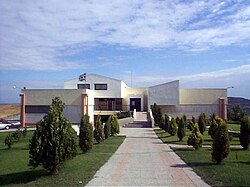Archaeological Museum of Amphipolis
This article or section may have been copied and pasted from another location, possibly in violation of Wikipedia's copyright policy. (April 2014) |

The Archaeological Museum of Amphipolis is a museum in Amphipolis, Central Macedonia, Greece. It is located in the archaeological site of ancient Amphipolis (a city founded in 437 BC), near River Strymon at close range of the Thessaloniki–Kavala national highway and within the walls of the ancient city itself. There is a stone- built cist tomb under the museum itself.
Description
The museum, on two floors, contains many items related to the history and civilisation of Amphipolis dating from the Archaic into the Byzantine period, and also from some of the ancient sites of the surrounding areas. It is well laid out and with labels and information panels.
The finds are displayed in chronological order and comprise the following groups:
- the prehistoric period (from Mount Pangaio and Ketil Tepes Hill); exhibiting a seal and a number of figurines of the Neolithic period (6000–3000 BC), the most important exhibits in the museum.
- the Archaic period (from Kasta Hill and the Iron Age cemetery at Amphipolis); exhibiting gold jewelry.
- the Classical and Hellenistic periods (from excavations on the archaeological site); exhibiting a figurine of a dancer performing the Peirihios Dance, three statues—of Orestes and Electra (2nd century BC), a female figure (4th century BC), and Aphrodite and Eros (2nd century BC)—a bust of the local deity Attis (1st century BC), a full-length siren tearing her hair and beating her breast, a silver reliquary with the gold olive wreath that was found inside it, and a gold wreath from a male burial.
- the Roman period (mosaics from a Roman house and from excavations in the local cemetery); exhibiting two mural paintings from the Roman house and a capital with rams’ heads carved in relief.
- the Early Christian period (from five Early Christian basilicas at Amphipolis);
- and the modern era (from a chapel found at a low elevation near Nea Amphipoli).
There are also finds from ancient Argilos and Eion, the port of ancient Amphipolis, together with wall panels relating the history of ancient Amphipolis and the surrounding area. Also, an 18th-century historians’ correspondence about ancient Amphipolis, along with photographs of the unearthing and restoration of the Lion of Amphipolis, in 1913.
-
Frescoes on display
-
A sirens statue
-
First floor exhibits
-
Inscribed grave stele
-
Mural paintings
-
Silver ossuary
-
Statues of Orestes and Electra
External links







